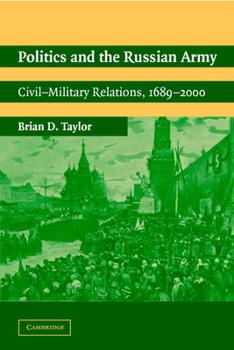Politics and the Russian Army: Civil-Military Relations, 1689 2000
Select Format
Select Condition 
Book Overview
Military coups have plagued many countries around the world, but Russia, despite its tumultuous history, has not experienced a successful military coup in over two centuries. In a series of detailed case studies, Brian Taylor explains the political role of the Russian military. Drawing on a wealth of new material, including archives and interviews, Taylor discusses every case of actual or potential military intervention in Russian politics from Peter the Great to Vladimir Putin. Taylor analyzes in particular detail the army's behavior during the political revolutions that marked the beginning and end of the twentieth century, two periods when the military was, uncharacteristically, heavily involved in domestic politics. He argues that a common thread unites the late-Imperial, Soviet, and post-Soviet Russian army: an organizational culture that believes that intervention against the country's political leadership - whether tsar, general secretary, or president - is fundamentally illegitimate.
Format:Paperback
Language:English
ISBN:0521016940
ISBN13:9780521016940
Release Date:June 2003
Publisher:Cambridge University Press
Length:374 Pages
Weight:1.16 lbs.
Dimensions:0.8" x 6.1" x 9.0"
Customer Reviews
1 rating
An interesting thesis
Published by Thriftbooks.com User , 21 years ago
Taylor contends that that since the failed uprising in 1825, the Russian military has become an apolitical organization. Tsar Nicholas I made the Russian miltitary into a apolitical organization by constant drill and using the secret police to spy on suspicious officers. Officers were driven away from politics in the late nineteenth century by concentrating on military reform and external threats such as Germany and Japan. Taylor believes that the Kornilov coup attempt was exageratted by Kerensky for his own political purposes and that most officers sided with the Bolsheviks during the Russian Civil War not out of ideology but to mantain order in the army. The Russian officer corps kept this apolitical tradtion alive during the thirties when they failed to respond to Stalin's purges but gave their attention to defense issues and the emerging military threats of Germany and Japan. In the 1990s the Russian military was relunctant to get invovled in domestic affairs and only intervened in 1993 because Yeltsin's foes set up a rival defense ministry that threatened the internal stability of the Russian army. The only weaknesses of Taylor's book is that he fails to mention the main reform intiated by Tsar Nicholas I which subordinated the Russian high command to the war ministry as writen about by Frederick Kagan in his book on the military reforms of Tsar Nicholas I. Nor does Taylor write about the role of the Russian military in the expulsion of Poles, Jews, and Germans in the First World War that historians Eric Lohr and Peter Gatrell stated were done on the army's own intiative and were outside of civilian control. Despite these weaknesses Taylor makes a strong case as to why Russia has not experienced a successful military coup in two hundred years.





